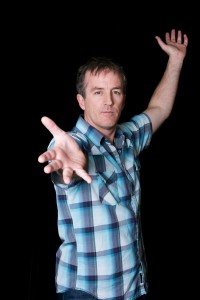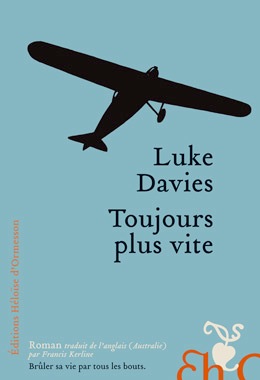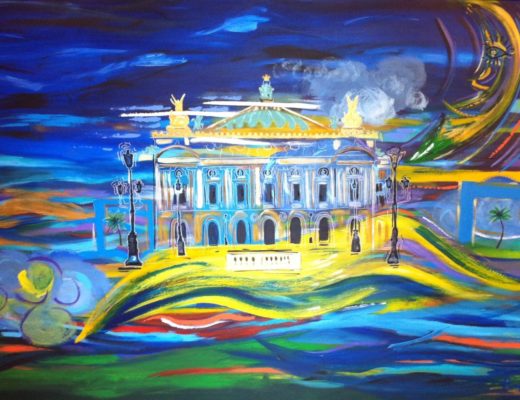
Prominent LA based Australian poet, novelist and screenwriter Luke Davies (Candy, Totem, Isabelle the Navigator) recently braved a month of minus temperatures in Paris to promote the French translation of his novel on 20th Century American icon Howard Hughes. God of Speed, or ‘Toujours plus vite’, is Davies’ second novel to be translated to French by Editions Héloïse d’Ormesson after Candy (also made into a feature film of the same name directed by Neil Armfield and starring Heath Ledger, Abbie Cornish and Geoffrey Rush). Davies talks to Ruby TV.
RTV: The French are already familiar with some of your work. Does this put more or less pressure on you for this novel to be liked and do well in France? What are your hopes and expectations for it?
LD: It really is just a pleasant icing-on-the-cake situation. That the book is out in France and available. My expectations aren’t that high to begin with. Getting a bunch of good reviews already has been a bonus. I don’t think in terms of sales, or that it has to do better than Candy. It’s all win-win. I mostly like the fact that my friends whose English reading is not so good can read it.
You got a great wrap in Les InRockuptibles who claimed the novel ‘a success’ and said that thematically you put your finger on the spot. How did you feel when you read this and what other feedback have you had? Can you detect any French twists on the interpretation?
I felt great! Les Inrockuptibles is a very, very hard magazine to get reviewed in. And it’s a cool magazine too. My publishers were telling me what a feat it was, so I felt a good glow. What else? I got reviews in places like La Tribune, Point de Vue and Le Magazine Litérraire. A French twist? For some reason the French are interested in and familiar with Hughes, and not just because of the Scorsese film. Philosophers like Paul Virilio have written about him at length, about what he represents in the modern era. A kind of haunted morality tale.
Since you understand French, were you working closely with your translator (Francis Kerline) or did he not come up for air until his work was done? Tell me about this relationship and process.
He didn’t come up for air. I was so busy, I never thought to fine-tooth-comb the book (in English) thinking about things that might be an issue, or worth discussing. And suddenly it was out. I did find two little things that might have been good to talk about. Other than that, my French literary reading skills are not so great that I can get the real subtlety and success of the book as a translation. But I have been relying on various friends telling me that in fact it’s a very good translation and that it flows along at a good pace. That’s what you want. For it to do something similar to what it does in English. With translation, you can never replicate exactly. It’s like you take an elephant, and, well, if you manage to create a hippopotamus, that’s pretty good. If it’s a buffalo, that wouldn’t be the same thing. If it looks like a cat, you’re in trouble.
Why did you write God of Speed, what was the most challenging part of the process and, in researching and writing it, what did you learn about yourself?
I was drawn to this mad, damaged character who seemed so representative of so many trends of the mad, damaged 20th century. Hughes touched on so many of the great themes: war, addiction, speed, money, corruption, politics, industry, Hollywood. So much was encapsulated, and yet the guy was real. I was also intrigued by an aspect no one had ever really delved into, in all the biographies, all the endless writings about Hughes: just how much his drug addiction was a form of medicating his obsessive-compulsive disorder, and how the two fed into each other in an endless loop. As a former heroin addict, and as someone who experiences — down the benign end of the spectrum, I might add — traces of OCD thought patterns, I really felt I knew how to get inside his mind. That’s why the book is a kind of demented interior monologue.
What else did you get up to during your month in Paris?
I shot a short film! Very spontaneous, simple. Had a producer, small crew. Everyone working pretty much for love. My oldest friend in Paris is Henri (‘Riton’) Liebman, who was a child star in the film that won the Oscar for Best Foreign Film 1979, ‘Preparez vos Mouchoirs’ (Get out Your Handkerchiefs) with Gerard Depardieu and Patrick Dewaere. Cool film. He’s a great actor, and a natural clown. I wrote this film with him in mind, and we just shot it, all over the streets of Paris. At the rough-cut edit stage now, lots to do…
What are you working on next?
Lots! The next novel and the next book of poetry. And the poetry book after that, too. (Been writing an awful lot of poems lately.) A children’s book, Magpie, comes out in Australia in May, and I’ve written two others, because the experience was fun. Looking for an illustrator now. Um… film and book reviews for a couple of magazines. Another short film soon, hopefully. And trying to sell a feature in LA. Various things on the boil.


